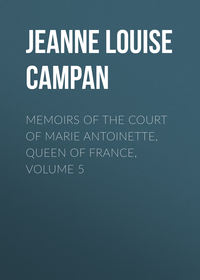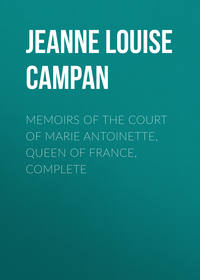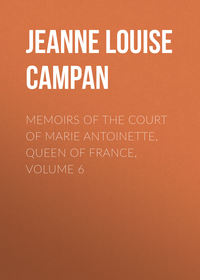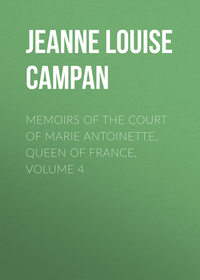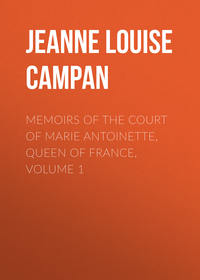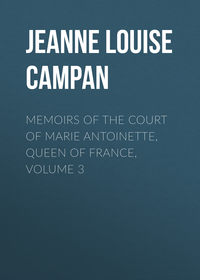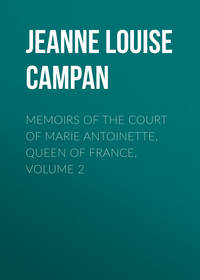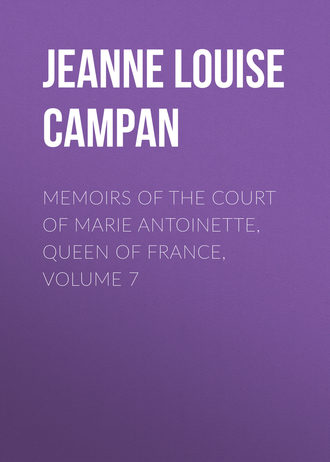 полная версия
полная версияMemoirs of the Court of Marie Antoinette, Queen of France, Volume 7
But even these harmless pursuits were too often made the means of further insulting and thwarting the unfortunate family. Commissary Le Clerc interrupted the Prince's writing lessons, proposing to substitute Republican works for those from which the King selected his copies. A smith, who was present when the Queen was reading the history of France to her children, denounced her to the Commune for choosing the period when the Connstable de Bourbon took arms against France, and said she wished to inspire her son with unpatriotic feelings; a municipal officer asserted that the multiplication table the Prince was studying would afford a means of "speaking in cipher," so arithmetic had to be abandoned. Much the same occurred even with the needlework, the Queen and Princess finished some chairbacks, which they wished to send to the Duchesse de Tarente; but the officials considered that the patterns were hieroglyphics, intended for carrying on a correspondence, and ordered that none of the Princesses work should leave the Temple. The short daily walk in the garden was also embittered by the rude behaviour of the military and municipal gaolers; sometimes, however, it afforded an opportunity for marks of sympathy to be shown. People would station themselves at the windows of houses overlooking the Temple gardens, and evince by gestures their loyal affection, and some of the sentinels showed, even by tears, that their duty was painful to them.
On the 21st September the National Convention was constituted, Petion being made president and Collot d'Herbois moving the "abolition of royalty" amidst transports of applause. That afternoon a municipal officer attended by gendarmes a cheval, and followed by a crowd of people, arrived at the Temple, and, after a flourish of trumpets, proclaimed the establishment of the French Republic. The man, says Clery, "had the voice of a Stentor." The royal family could distinctly hear the announcement of the King's deposition. "Hebert, so well known under the title of Pere Duchesne, and Destournelles were on guard. They were sitting near the door, and turned to the King with meaning smiles. He had a book in his hand, and went on reading without changing countenance. The Queen showed the same firmness. The proclamation finished, the trumpets sounded afresh. I went to the window; the people took me for Louis XVI. and I was overwhelmed with insults."
After the new decree the prisoners were treated with increased harshness. Pens, paper, ink, and pencils were taken from them. The King and Madame Elisabeth gave up all, but the Queen and her daughter each concealed a pencil. "In the beginning of October," says Madame Royale, "after my father had supped, he was told to stop, that he was not to return to his former apartments, and that he was to be separated from his family. At this dreadful sentence the Queen lost her usual courage. We parted from him with abundance of tears, though we expected to see him again in the morning.
[At nine o'clock, says Clery, the King asked to be taken to his family, but the municipal officers replied that they had "no orders for that." Shortly afterwards a boy brought the King some bread and a decanter of lemonade for his breakfast. The King gave half the bread to Clery, saying, "It seems they have forgotten your breakfast; take this, the rest is enough for me." Clery refused, but the King insisted. "I could not contain my tears," he adds; "the King perceived them, and his own fell also."]
They brought in our breakfast separately from his, however. My mother would take nothing. The officers, alarmed at her silent and concentrated sorrow, allowed us to see the King, but at meal-times only, and on condition that we should not speak low, nor in any foreign language, but loud and in 'good French.' We went down, therefore, with the greatest joy to dine with my father. In the evening, when my brother was in bed, my mother and my aunt alternately sat with him or went with me to sup with my father. In the morning, after breakfast, we remained in the King's apartments while Clery dressed our hair, as he was no longer allowed to come to my mother's room, and this arrangement gave us the pleasure of spending a few moments more with my father."
[When the first deputation from the Council of the Commune visited the Temple, and formally inquired whether the King had any complaint to make, he replied, "No; while he was permitted to remain with his family he was happy."]
The royal prisoners had no comfort except their affection for each other. At that time even common necessaries were denied them. Their small stock of linen had been lent them; by persons of the Court during the time they spent at the Feuillans. The Princesses mended their clothes every day, and after the King had gone to bed Madame Elisabeth mended his. "With much trouble," says Clrry, "I procured some fresh linen for them. But the workwomen having marked it with crowned letters, the Princesses were ordered to pick them out." The room in the great tower to which the King had been removed contained only one bed, and no other article of furniture. A chair was brought on which Clery spent the first night; painters were still at work on the room, and the smell of the paint, he says, was almost unbearable. This room was afterwards furnished by collecting from various parts of the Temple a chest of drawers, a small bureau, a few odd chairs, a chimney-glass, and a bed hung with green damask, which had been used by the captain of the guard to the Comte d'Artois. A room for the Queen was being prepared over that of the King, and she implored the workmen to finish it quickly, but it was not ready for her occupation for some time, and when she was allowed to remove to it the Dauphin was taken from her and placed with his father. When their Majesties met again in the great Tower, says Clery, there was little change in the hours fixed for meals, reading, walking and the education of their children. They were not allowed to have mass said in the Temple, and therefore commissioned Clery to get them the breviary in use in the diocese of Paris. Among the books read by the King while in the Tower were Hume's "History of England" (in the original), Tasso, and the "De Imitatione Christi." The jealous suspicions of the municipal officers led to the most absurd investigations; a draught-board was taken to pieces lest the squares should hide treasonable papers; macaroons were broken in half to see that they did not contain letters; peaches were cut open and the stones cracked; and Clery was compelled to drink the essence of soap prepared for shaving the King, under the pretence that it might contain poison.
In November the King and all the family had feverish colds, and Clery had an attack of rheumatic fever. On the first day of his illness he got up and tried to dress his master, but the King, seeing how ill he was, ordered him to lie down, and himself dressed the Dauphin. The little Prince waited on Clery all day, and in the evening the King contrived to approach his bed, and said, in a low voice, "I should like to take care of you myself, but you know how we are watched. Take courage; tomorrow you shall see my doctor." Madame Elisabeth brought the valet cooling draughts, of which she deprived herself; and after Clery was able to get up, the young Prince one night with great difficulty kept awake till eleven o'clock in order to give him a box of lozenges when he went to make the King's bed.
On 7th December a deputation from the Commune brought an order that the royal family should be deprived of "knives, razors, scissors, penknives, and all other cutting instruments." The King gave up a knife, and took from a morocco case a pair of scissors and a penknife; and the officials then searched the room, taking away the little toilet implements of gold and silver, and afterwards removing the Princesses' working materials. Returning to the King's room, they insisted upon seeing what remained in his pocket-case. "Are these toys which I have in my hand also cutting instruments?" asked the King, showing them a cork-screw, a turn-screw, and a steel for lighting. These also were taken from him. Shortly afterwards Madame Elisabeth was mending the King's coat, and, having no scissors, was compelled to break the thread with her teeth.
"What a contrast!" he exclaimed, looking at her tenderly. "You wanted nothing in your pretty house at Montreuil."
"Ah, brother," she answered, "how can I have any regret when I partake your misfortunes?"
The Queen had frequently to take on herself some of the humble duties of a servant. This was especially painful to Louis XVI. when the anniversary of some State festival brought the contrast between past and present with unusual keenness before him.
"Ah, Madame," he once exclaimed, "what an employment for a Queen of France! Could they see that at Vienna! Who would have foreseen that, in uniting your lot to mine, you would have descended so low?"
"And do you esteem as nothing," she replied, "the glory of being the wife of one of the best and most persecuted of men? Are not such misfortunes the noblest honours?"—[Alison's "History of Europe," vol. ii., p. 299.]
Meanwhile the Assembly had decided that the King should be brought to trial. Nearly all parties, except the Girondists, no matter how bitterly opposed to each other, could agree in making him the scapegoat; and the first rumour of the approaching ordeal was conveyed to the Temple by Clery's wife, who, with a friend, had permission occasionally to visit him. "I did not know how to announce this terrible news to the King," he says; "but time was pressing, and he had forbidden my concealing anything from him. In the evening, while undressing him, I gave him an account of all I had learnt, and added that there were only four days to concert some plan of corresponding with the Queen. The arrival of the municipal officer would not allow me to say more. Next morning, when the King rose, I could not get a moment for speaking with him. He went up with his son to breakfast with the Princesses, and I followed. After breakfast he talked long with the Queen, who, by a look full of trouble, made me understand that they were discussing what I had told the King. During the day I found an opportunity of describing to Madame Elisabeth how much it had cost me to augment the King's distresses by informing him of his approaching trial. She reassured me, saying that the King felt this as a mark of attachment on my part, and added, 'That which most troubles him is the fear of being separated from us.' In the evening the King told me how satisfied he was at having had warning that he was to appear before the Convention. 'Continue,' he said, 'to endeavour to find out something as to what they want to do with me. Never fear distressing me. I have agreed with my family not to seem pre-informed, in order not to compromise you.'"
On the 11th December, at five o'clock in the morning, the prisoners heard the generale beaten throughout Paris, and cavalry and cannon entered the Temple gardens. At nine the King and the Dauphin went as usual to breakfast with the Queen. They were allowed to remain together for an hour, but constantly under the eyes of their republican guardians. At last they were obliged to part, doubtful whether they would ever see each other again. The little Prince, who remained with his father, and was ignorant of the new cause for anxiety, begged hard that the King would play at ninepins with him as usual. Twice the Dauphin could not get beyond a certain number. "Each time that I get up to sixteen," he said, with some vexation, "I lose the game." The King did not reply, but Clery fancied the words made a painful impression on him.
At eleven, while the King was giving the Dauphin a reading lesson, two municipal officers entered and said they had come "to take young Louis to his mother." The King inquired why, but was only told that such were the orders of the Council. At one o'clock the Mayor of Paris, Chambon, accompanied by Chaumette, Procureur de la Commune, Santerre, commandant of the National Guard, and others, arrived at the Temple and read a decree to the King, which ordered that "Louis Capet" should be brought before the Convention. "Capet is not my name," he replied, "but that of one of my ancestors. I could have wished," he added, "that you had left my son with me during the last two hours. But this treatment is consistent with all I have experienced here. I follow you, not because I recognise the authority of the Convention, but because I can be compelled to obey it." He then followed the Mayor to a carriage which waited, with a numerous escort, at the gate of the Temple. The family left behind were overwhelmed with grief and apprehension. "It is impossible to describe the anxiety we suffered," says Madame Royale. "My mother used every endeavour with the officer who guarded her to discover what was passing; it was the first time she had condescended to question any of these men. He would tell her nothing."
Trial of the King.—Parting of the Royal Family.—Execution.
The crowd was immense as, on the morning of the 11th December, 1792, Louis XVI. was driven slowly from the Temple to the Convention, escorted by cavalry, infantry, and artillery. Paris looked like an armed camp: all the posts were doubled; the muster-roll of the National Guard was called over every hour; a picket of two hundred men watched in the court of each of the right sections; a reserve with cannon was stationed at the Tuileries, and strong detachments patroled the streets and cleared the road of all loiterers. The trees that lined the boulevards, the doors and windows of the houses, were alive with gazers, and all eyes were fixed on the King. He was much changed since his people last beheld him. The beard he had been compelled to grow after his razors were taken from him covered cheeks, lips, and chin with light-coloured hair, which concealed the melancholy expression of his mouth; he had become thin, and his garments hung loosely on him; but his manner was perfectly collected and calm, and he recognised and named to the Mayor the various quarters through which he passed. On arriving at the Feuillans he was taken to a room to await the orders of the Assembly.
It was about half-past two when the King appeared at the bar. The Mayor and Generaux Santerre and Wittengoff were at his side. Profound silence pervaded the Assembly. All were touched by the King's dignity and the composure of his looks under so great a reverse of fortune. By nature he had been formed rather to endure calamity with patience than to contend against it with energy. The approach of death could not disturb his serenity.
"Louis, you may be seated," said Barere. "Answer the questions that shall be put to you." The King seated himself and listened to the reading of the 'acte enonciatif', article by article. All the faults of the Court were there enumerated and imputed to Louis XVI. personally. He was charged with the interruption of the sittings of the 20th of June, 1789, with the Bed of Justice held on the 23d of the same month, the aristocratic conspiracy thwarted by the insurrection of the 14th of July, the entertainment of the Life Guards, the insults offered to the national cockade, the refusal to sanction the Declaration of Rights, as well as several constitutional articles; lastly, all the facts which indicated a new conspiracy in October, and which were followed by the scenes of the 5th and 6th; the speeches of reconciliation which had succeeded all these scenes, and which promised a change that was not sincere; the false oath taken at the Federation of the 14th of July; the secret practices of Talon and Mirabeau to effect a counter-revolution; the money spent in bribing a great number of deputies; the assemblage of the "knights of the dagger" on the 28th of February, 1791; the flight to Varennes; the fusilade of the Champ de Mars; the silence observed respecting the Treaty of Pilnitz; the delay in the promulgation of the decree which incorporated Avignon with France; the commotions at Nimes, Montauban, Mende, and Jales; the continuance of their pay to the emigrant Life Guards and to the disbanded Constitutional Guard; the insufficiency of the armies assembled on the frontiers; the refusal to sanction the decree for the camp of twenty thousand men; the disarming of the fortresses; the organisation of secret societies in the interior of Paris; the review of the Swiss and the garrison of the palace on the 10th August; the summoning the Mayor to the Tuileries; and lastly, the effusion of blood which had resulted from these military dispositions. After each article the President paused, and said, "What have you to answer?" The King, in a firm voice, denied some of the facts, imputed others to his ministers, and always appealed to the constitution, from which he declared he had never deviated. His answers were very temperate, but on the charge, "You spilt the blood of the people on the 10th of August," he exclaimed, with emphasis, "No, monsieur, no; it was not I."
All the papers on which the act of accusation was founded were then shown to the King, and he disavowed some of them and disputed the existence of the iron chest; this produced a bad impression, and was worse than useless, as the fact had been proved.
[A secret closet which the King had directed to be constructed in a wall in the Tuileries. The door was of iron, whence it was afterwards known by the name of the iron chest. See Thiers, and Scott.]
Throughout the examination the King showed great presence of mind. He was careful in his answers never to implicate any members of the constituent, and legislative Assemblies; many who then sat as his judges trembled lest he should betray them. The Jacobins beheld with dismay the profound impression made on the Convention by the firm but mild demeanour of the sovereign. The most violent of the party proposed that he should be hanged that very night; a laugh as of demons followed the proposal from the benches of the Mountain, but the majority, composed of the Girondists and the neutrals, decided that he should be formally tried.
After the examination Santerre took the King by the arm and led him back to the waiting-room of the Convention, accompanied by Chambon and Chaumette. Mental agitation and the length of the proceedings had exhausted him, and he staggered from weakness. Chaumette inquired if he wished for refreshment, but the King refused it. A moment after, seeing a grenadier of the escort offer the Procureur de la Commune half a small loaf, Louis XVI. approached and asked him, in a whisper, for a piece.
"Ask aloud for what you want," said Chaumette, retreating as though he feared being suspected of pity.
"I asked for a piece of your bread," replied the King.
"Divide it with me," said Chaumette. "It is a Spartan breakfast. If I had a root I would give you half."—[Lamartine's "History of the Girondists," edit. 1870, vol. ii., p. 313.]
Soon after six in the evening the King returned to the Temple. "He seemed tired," says Clery, simply, "and his first wish was to be led to his family. The officers refused, on the plea that they had no orders. He insisted that at least they should be informed of his return, and this was promised him. The King ordered me to ask for his supper at half-past eight. The intervening hours he employed in his usual reading, surrounded by four municipals. When I announced that supper was served, the King asked the commissaries if his family could not come down. They made no reply. 'But at least,' the King said, 'my son will pass the night in my room, his bed being here?' The same silence. After supper the King again urged his wish to see his family. They answered that they must await the decision of the Convention. While I was undressing him the King said, 'I was far from expecting all the questions they put to me.' He lay down with perfect calmness. The order for my removal during the night was not executed." On the King's return to the Temple being known, "my mother asked to see him instantly," writes Madame Royale. "She made the same request even to Chambon, but received no answer. My brother passed the night with her; and as he had no bed, she gave him hers, and sat up all the night in such deep affliction that we were afraid to leave her; but she compelled my aunt and me to go to bed. Next day she again asked to see my father, and to read the newspapers, that she might learn the course of the trial. She entreated that if she was to be denied this indulgence, his children, at least, might see him. Her requests were referred to the Commune. The newspapers were refused; but my brother and I were to be allowed to see my father on condition of being entirely separated from my mother. My father replied that, great as his happiness was in seeing his children, the important business which then occupied him would not allow of his attending altogether to his son, and that his daughter could not leave her mother."
[During their last interview Madame Elisabeth had given Clery one of her handkerchiefs, saying, "You shall keep it so long as my brother continues well; if he becomes ill, send it to me among my nephew's things."]
The Assembly having, after a violent debate, resolved that Louis XVI. should have the aid of counsel, a deputation was sent to the Temple to ask whom he would choose. The King named Messieurs Target and Tronchet. The former refused his services on the ground that he had discontinued practice since 1785; the latter complied at once with the King's request; and while the Assembly was considering whom to, nominate in Target's place, the President received a letter from the venerable Malesherbes,
[Christian Guillaume de Lamoignon de Malesherbes, an eminent French statesman, son of the Chancellor of France, was born at Paris in 1721. In 1750 he succeeded his father as President of the Court of Aids, and was also made superintendent of the press. On the banishment of the Parliaments and the suppression of the Court of Aids, Malesherbes was exiled to his country-seat. In 1775 he was appointed Minister of State. On the decree of the Convention for the King's trial, he emerged from his retreat to become the voluntary advocate of his sovereign. Malesherbes was guillotined in 1794, and almost his whole family were extirpated by their merciless persecutors.]
then seventy years old, and "the most respected magistrate in France," in the course of which he said: "I have been twice called to be counsel for him who was my master, in times when that duty was coveted by every one. I owe him the same service now that it is a duty which many people deem dangerous. If I knew any possible means of acquainting him with my desires, I should not take the liberty of addressing myself to you." Other citizens made similar proposals, but the King, being made acquainted with them by a deputation from the Commune, while expressing his gratitude for all the offers, accepted only that of Malesherbes.
[The Citoyenne Olympia Degonges, calling herself a free and loyal Republican without spot or blame, and declaring that the cold and selfish cruelty of Target had inflamed her heroism and roused her sensibility, asked permission to assist M, de Malesherbes in defending the King. The Assembly passed to the order of the day on this request.—BERTRAND DE MOLLEVILLE, "Annals," edit. 1802, vol, viii., p. 254.]
On 14th December M. Tronchet was allowed to confer with the King, and later in the same day M. de Malesherbes was admitted to the Tower. "The King ran up to this worthy old man, whom he clasped in his arms," said Clery, "and the former minister melted into tears at the sight of his master."
[According to M. de Hue, "The first time M. de Malesherbes entered the Temple, the King clasped him in his arms and said, 'Ah, is it you, my friend? You fear not to endanger your own life to save mine; but all will be useless. They will bring me to the scaffold. No matter; I shall gain my cause if I leave an unspotted memory behind me.'"]
Another deputation brought the King the Act of Accusation and the documents relating to it, numbering more than a hundred, and taking from four o'clock till midnight to read. During this long process the King had refreshments served to the deputies, taking nothing himself till they had left, but considerately reproving Clery for not having supped. From the 14th to the 26th December the King saw his counsel and their colleague M. de Size every day. At this time a means of communication between the royal family and the King was devised: a man named Turgi, who had been in the royal kitchen, and who contrived to obtain employment in the Temple, when conveying the meals of the royal family to their apartments, or articles he had purchased for them, managed to give Madame Elisabeth news of the King. Next day, the Princess, when Turgi was removing the dinner, slipped into his hand a bit of paper on which she had pricked with a pin a request for a word from her brother's own hand. Turgi gave this paper to Clery, who conveyed it to the King the same evening; and he, being allowed writing materials while preparing his defence, wrote Madame Elisabeth a short note. An answer was conveyed in a ball of cotton, which Turgi threw under Clery's bed while passing the door of his room. Letters were also passed between the Princess's room and that of Clery, who lodged beneath her, by means of a string let down and drawn up at night. This communication with his family was a great comfort to the King, who, nevertheless, constantly cautioned his faithful servant. "Take care," he would say kindly, "you expose yourself too much."


